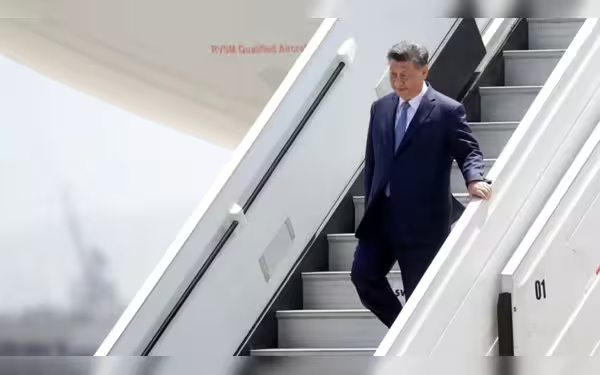Saturday, November 16, 2024 10:01 PM
Xi Jinping Seizes Opportunity Amid Trump’s Return
- Xi aims to exploit Trump's presidency for strategic gains.
- China seeks to strengthen ties with US allies.
- Upcoming summits crucial for shaping international relations.
 Image Credits: thefrontierpost
Image Credits: thefrontierpostXi Jinping looks to leverage Trump's return to reshape global dynamics and strengthen China's position at upcoming summits.
As global leaders prepare to convene for two significant summits in South America, the political landscape is charged with uncertainty, particularly due to Donald Trump’s anticipated return to the White House. This situation raises critical questions about the implications of Trump’s "America First" agenda on the global economy and ongoing conflicts in Europe and the Middle East. Among the nations closely monitoring these developments is China, which is bracing for potentially tumultuous relations with the United States.
For Chinese leader Xi Jinping, the upcoming gatherings present a unique opportunity to further Beijing's strategic goals. With Trump’s election victory, Xi aims to exploit the situation by driving a wedge between the US and its allies while positioning China as a stable alternative leader on the world stage. The effectiveness of China's diplomatic efforts at the APEC summit in Peru and the G20 meeting in Brazil could be pivotal in navigating the anticipated challenges ahead.
During his first term, Trump initiated a trade and technology war with China, framing the nation as a rival to the United States. This approach has been largely continued by his successor, Joe Biden, who has further strained relations by aligning closely with US allies in his China policy. With Trump’s second term potentially bringing heavier tariffs and increased uncertainty, Xi and his team are likely to be very strategic in their diplomatic engagements at these summits.
Notable leaders, including President Biden, Japanese Prime Minister Shigeru Ishiba, and Australian Prime Minister Anthony Albanese, are expected to attend both summits, while Indian Prime Minister Narendra Modi will participate in the G20. According to Li Mingjiang, an associate professor of international relations, "It makes sense for Chinese officials to use these big events to try and shape some of the international narratives right now, especially with the clock ticking down to January 2025."
Trump has proposed imposing tariffs of over 60% on all Chinese imports, which could further complicate the already tense economic relationship. His administration is also expected to be filled with individuals who are critical of China, raising concerns in Beijing. Xi’s recent congratulatory message to Trump highlighted these worries, emphasizing that both nations "will both benefit from cooperation and lose from confrontation." This message may be reiterated during a planned meeting between Xi and Biden in Lima, where China aims to convey its desire for stable communication.
As the specter of heightened tensions looms over US-China relations, Beijing is keenly aware of the importance of maintaining good ties with a diverse array of countries. This strategy is crucial for safeguarding its economy, especially in light of slowing growth and rising unemployment at home. The uncertainty surrounding Trump’s presidency presents an opportunity for China to undermine the increasing coordination that had developed between the US and its allies under Biden.
Leaders who previously collaborated with Biden are now watching closely to see how Trump’s unpredictable style of diplomacy might reshape their relationships. Trump has threatened to impose tariffs on goods from all countries, including allies, and has made controversial statements regarding defense spending and NATO. Liu Dongshu, an assistant professor of international affairs, noted, "China wants to signal that it’s not going to be very wise to completely side with the US – and to consider working with China as well."
In recent months, China has taken steps to strengthen its relationships with key US allies, such as offering visa-free entry for citizens from several European nations and resuming trilateral talks with Japan and South Korea. Additionally, Xi and Indian Prime Minister Modi recently held their first formal meeting in five years, marking a significant step towards easing tensions along their contested border.
As Xi and his delegation prepare for the upcoming summits, they are likely to emphasize China’s commitment to global stability and economic opportunities. Yun Sun, director of the China program at the Stimson Center, stated, "For G20 and APEC, China’s message will be ‘There is major uncertainty ahead, but China is the certainty and will remain committed to peace and development.'" However, observers caution that winning the trust of US partners will be a challenging task for Chinese leaders, especially given Xi’s assertive actions in the South China Sea and support for Russia amid the ongoing conflict in Ukraine.
As the world watches the unfolding dynamics between the US and China, it is clear that the upcoming summits will be crucial for shaping future international relations. The ability of China to navigate this complex landscape while promoting its interests will be tested, and the outcomes could have lasting implications for global stability and economic cooperation. The stakes are high, and the world is keenly observing how these powerful nations will interact in the face of uncertainty.













